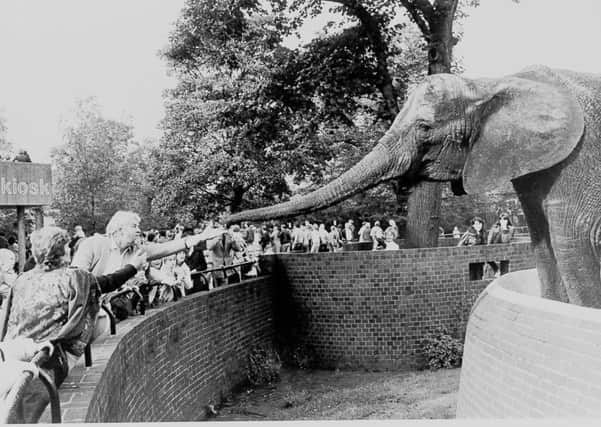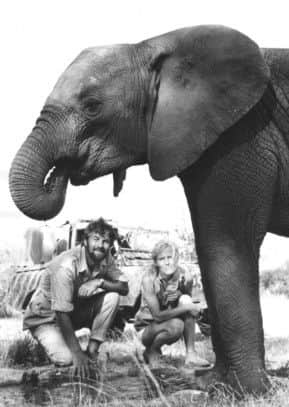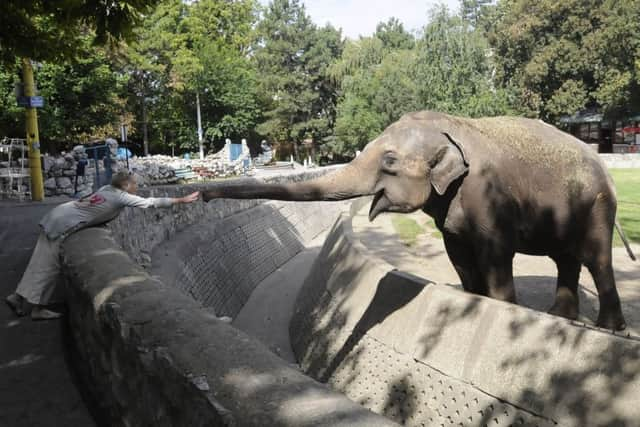Damning report issued on anniversary of elephant’s death which inspired founding of Horsham-based charity


The Born Free Foundation, originally known as Zoo Check, is based in Foundry Lane and was founded in response to the destruction of the elephant named Pole Pole in 1983.
The milestone also coincides with the publication of a damning report, ‘Innocent Prisoner’, by the charity which exposes the lives endured by some of the 40 or more elephants living in solitary confinement throughout Europe.
Advertisement
Hide AdAdvertisement
Hide Ad“I suppose what’s really shocking is that over this time where we’ve learnt so much more about the nature of elephants because of all the studies how they behave in the wild, and their wonderful caring family relationships they have and loyalties, that it’s made no difference,” explained actress Virginia McKenna OBE who founded the Born Free Foundation.


“We don’t seem to be interested in the nature of the animal if we can keep them solitary - if we can keep them at all in captivity which I’m opposed to - but solitary is actually cruel. I mean how can it not be?”
Pole Pole had been captured from the wild, aged 2, as a gift from the then Kenya government to London Zoo.
While in the trapper’s yard in Nairobi she became known to actors Virginia and her husband Bill Travers and was temporarily released to take part in their classic film An Elephant Called Slowly.
Advertisement
Hide AdAdvertisement
Hide AdAfter filming, the actors appealed to the government to allow Pole Pole to be released for eventual reintroduction to the wild and, although the answer was positive, the authorities confirmed that another elephant would have to be captured to take her place.


Appalled by the thought of subjecting another elephant family to the inevitable trauma and distress involved, Pole Pole travelled to London Zoo, arriving in 1968, where she was held in the infamous concrete Elephant House for 15 years.
Following a letter from world-famous elephant expert, Dame Dr Daphne Sheldrick, informing them that Pole Pole (now the only elephant at the zoo) had become ‘difficult to manage and might be destroyed’, Bill and Virginia went to see the situation for themselves.
They saw Pole Pole pacing at the back of the yard and called her name. They were instantly recognised and Pole Pole rushed across the enclosure to greet them, reaching out with her trunk to touch Bill’s outstretched hand.
Advertisement
Hide AdAdvertisement
Hide Ad“I recall this moment with a great mixture of fondness and sadness,” added Virginia.
“It broke our hearts to see her alone and so far removed from what should have been her home, and her family, in Africa.
“We immediately asked for her to be returned to Kenya, but the zoo refused,” she continued. “Instead they decided to move her to Whipsnade Wildlife Park”.
The zoo’s attempt to relocate her went tragically wrong. She collapsed in the traveling crate, damaged a foot, was sedated a week later for a veterinary examination, apparently ‘lost the will to live’, and was euthanased on 17th October 1983. Her death caused a public outcry but Virginia and Bill were determined it would not be in vain.
Advertisement
Hide AdAdvertisement
Hide AdTogether with their son, Will Travers, they responded by setting up Zoo Check, a zoo watchdog organisation described at the time as a ‘nine day wonder’.
Nearly 30 years later, its successor, the internationally-respected Born Free Foundation, is a leading voice speaking out on behalf of captive wild animals and threatened species around the world.
Virginia is still actively involved in the work of the Foundation, recently visited one such elephant, Twiggy, at Belgrade Zoo in Serbia. Twiggy had been moved between five different zoos in Britain throughout the 1980s, before eventually ending up in Serbia in 1990. She has been alone since 1997.
She was deeply distressed by what she found when she saw Twiggy for the first time: “I honestly thought that the days of keeping intelligent, social, family-oriented species like elephants in solitary confinement were long gone. That no more elephants would suffer what Pole Pole had to endure. How wrong I was. It was heart-breaking, reaching out to Twiggy as I had done to Pole Pole all those years ago and realising that for her, the nightmare was still a reality.”
Advertisement
Hide AdAdvertisement
Hide AdWill Travers OBE, CEO of the Born Free Foundation said: “Thirty years ago Pole Pole’s death sent shockwaves around the captive industry.
“We thought the keeping of elephants in solitary would soon become a distant memory.
“It seems many zoos and circuses have learned nothing and are willing to live in the past. Our mission is simple: Over the next 30 years we want to see the compassionate phasing-out of elephants in captivity in Europe and, specifically, ensure that the keeping of elephants alone can never happen again.”
Chris Draper, Born Free’s Senior Programmes Manager for Captive Wild Animals/Science, added: “With the best will in the world, zoos and circuses cannot replicate the social and physical environment that elephants have evolved to live in. This means that what elephants want and need, compared to what they can be provided with in captivity, are very different.
Advertisement
Hide AdAdvertisement
Hide Ad“One of their key requirements is social interaction with members of their own species. Denying this risks severely compromising elephant welfare.”
Born Free is calling for the establishment of the first genuine elephant sanctuary in Europe and for the elephants currently housed alone to be relocated there. Key criteria for such a sanctuary include: opportunities for social contact with other elephants; ensuring that female elephants remain with their friends, family and companions unless lives are at risk; enforcing a no breeding policy to make sure that sanctuary space goes to the most needy; campaigning for an end to imports of elephants from the wild; and supporting all appropriate measures to conserve and protect elephants in their natural habitat.
Pole Pole started a movement 30 years ago whose work continues to this day. In her memory, Born Free is asking for people to support their campaign by joining the Born Free Foundation and Virginia’s efforts, in memory of London Zoo’s elephant ghost, Pole Pole.
For more information, visit www.bornfree.org.uk/polepole
An exclusive interview with Virginia McKenna will be featured in next week’s paper (October 24).